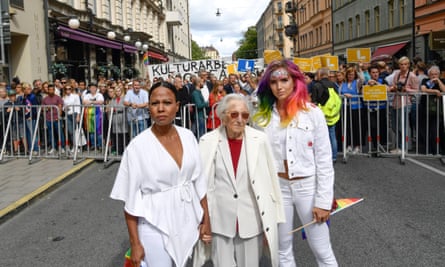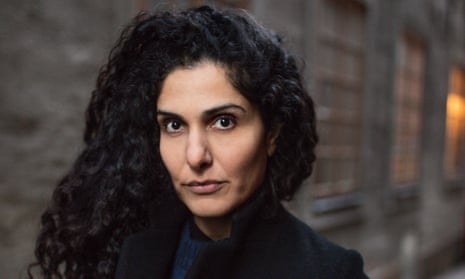When a young woman with rainbow hair and a reputation for hostility towards sexual predators won a Swedish lawyer of the year award late last year, the online reaction came in two waves.
The first was unpleasant, a torrent of bile from people who objected to Linnéa Claeson’s looks, her feminist politics, her gender, her youth and her instagram account @assholesonline.
The second was less familiar: a blizzard of positive messages – congratulations, praise for her bravery and for acting as a role model despite the abusive comments.
Quick GuideWhat is the Upside?
Show
Ever wondered why you feel so gloomy about the world - even at a time when humanity has never been this healthy and prosperous? Could it be because news is almost always grim, focusing on confrontation, disaster, antagonism and blame?
This series is an antidote, an attempt to show that there is plenty of hope, as our journalists scour the planet looking for pioneers, trailblazers, best practice, unsung heroes, ideas that work, ideas that might and innovations whose time might have come.
Readers can recommend other projects, people and progress that we should report on by contacting us at theupside@theguardian.com
The surge of support was orchestrated by an organisation called #jagärhär (#Iamhere), a Facebook group of about 75,000 people, most of them in Sweden. Fed up with the rude, confrontational nature of online conversation and the way that a few bad mouths can ruin a discussion, they have made it their business to turn bad threads good.
Every day, the group aims to do what government and social media companies have failed to do: defend people being attacked online by trolls and push back against the spread of misinformation.
#Jagärhär mobilises members to add positive notes on comment sections where hatred and misinformation is being spread. This, they believe, rebalances the discussion online and disrupts Facebook’s algorithm.
“Of course, social media does not reflect the overall population, but when you read the comment field, you often get the sense that 80% of the population thinks that homosexuality is a disease, for example,” said Mina Dennert, #jagärhär’s founder.
“We want the comment section to look more like society and the way to do this is enable people to speak and participate.”
After #jagärhär intervened in the comment sections talking about Claeson, the tone of the conversation improved palpably. The daily Swedish newspaper Aftonbladet even began moderating comments on its Facebook page, deleting the worst examples of hate speech.

“It’s so tiring that everything that has to do with me has such a negative connotation. Thank you for the love,” Claeson said in a Facebook post in the #jagärhär group.
Dennert, a journalist, launched her initiative in 2016, after seeing more and more disturbing remarks on social media. “What made me want to do something was seeing people I didn’t expect this from starting to repost really racist things.”
She created a small Facebook group which started out by asking those spreading misinformation for facts to back up their statements.
The morning after Donald Trump was elected, Dennert was overwhelmed with requests from thousands of people to join her group. In the months that followed, #jagärhär would change its approach, espousing neutrality in how its members reacted, and in most cases, simply mobilising support for people who were being harassed online.
Dennert has won several awards for her work, including the prestigious Anna Lindh prize in 2017 for supporting just and democratic ideals. The Swedish rock group, Kent, even donated the proceeds of a photo auction to the group.
But the attention also brought a massive backlash. Dennert regularly receives death threats, and at one point her father received bullets in the post. Trolls also doxed Dennert and her husband, Magnus Dennert, also a journalist, publishing sensitive personal data which they said related to the pair.
As the personal attacks mounted, Dennert saw a sharp decline in support. At the beginning, many companies wanted to collaborate. But that changed. “The first year, we were so loved and we won all these prizes, and everyone wanted to work with us. But once the attacks started, the people who wanted to collaborate with us, they completely stopped. They were scared.”
Critics call #jagärhär censorship, but Dennert and the moderators on the group are quick to emphasise that #jagärhär never comes with an agenda. They don’t tell people what to say. They simply want to defend those who are being attacked online.
Orla Vigsö is a professor in the journalism, media and communication department at the University of Gothenburg. He is skeptical that #jagärhär can actually have an influence on the social media algorithms because trolls and people on the far right are much more prolific and are very organised. He hopes that #jagärhär is reducing the amount of online hate speech and misinformation people see, but he adds that it is “extremely hard to measure” and it may be wishful thinking on his part.
Roger Wiklander, one of 18 group administrators for #jagärhär, says that for him the group is about speaking up against hate and misinformation in a united way and giving others the courage to do the same.
One comment really sticks out to Wiklander. On an article encouraging people to donate clothes to refugees, a person wrote “Ha-ha-ha, garbage for trash!” For him, it’s comments like this one that make him do this sort of work.
Since 2016, the Swedish online love army has spread to other countries in Europe. Sister groups have been created and are now active across the continent, most notably in Germany and Slovakia, whose groups have 45,000 and 6,000 members respectively. The groups largely function independently.
This article is part of a series on possible solutions to some of the world’s most stubborn problems. What else should we cover? Email us at theupside@theguardian.com

Comments (…)
Sign in or create your Guardian account to join the discussion